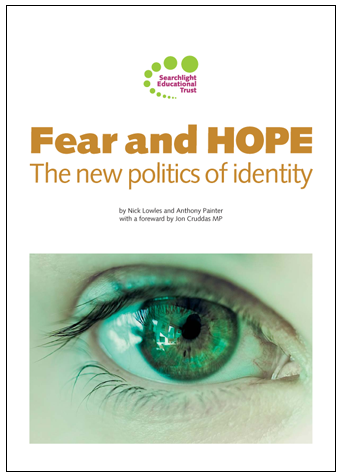The Guardian gives this stark summary of the findings of a Populus opinion poll conducted for Searchlight Educational Trust:
Some 39% of Asian Britons, 34% of white Britons and 21% of black Britons now believe all immigration into the UK should be stopped permanently, or at least until the UK’s economic situation improves. Meanwhile, 52% of Britons agree with the proposition “Muslims create problems in the UK”, and 43% of Asian Britons, 63% of white Britons and 17% of black Britons agree with the proposition that “on the whole, immigration into Britain has been a bad thing for the country”. In addition, 48% of Britons say they would consider supporting a new far right-wing party, if it shunned violence and fascist imagery
 The full details of the report will not be posted 0n the Searchlight website until Tuesday morning Australian eastern time but this is the executive summary:
The full details of the report will not be posted 0n the Searchlight website until Tuesday morning Australian eastern time but this is the executive summary:
The key findings of the Fear and HOPE report reveal:
A new politics of identity, culture, and nation has grown out of the politics of race and immigration, and is increasingly the opinion driver in modern British politics.
Six identity ‘tribes’ in modern British society. These are: Confident Multiculturalists (eight per cent of the population); Mainstream Liberals (16%); Identity Ambivalents (28%); Cultural Integrationists (24%); Latent Hostiles (10%); and Active Enmity (13%).
There is a clear correlation between economic pessimism and negative attitudes towards immigration. The more pessimistic people are about their own economic situation and their prospects for the future the more hostile their attitudes are to new and old immigrants.
There is a new middle ground of British politics that is defined by two groups of voters: Cultural Integrationists who are motived by authority and order; and Identity Ambivalents who are concerned about their economic security and social change. Together they make up 52% of the population.
Mainstream political parties risk pushing the Identity Ambivalents to the Right unless they tackle the social and economic insecurity which dominates their attitudes. This is a challenge for the current Government – which is implementing deep spending cuts – and for the Labour Party, which is the traditional home of many of these voters. Almost half of all voters who do not identify with a party are Identity Ambivalents.
While more likely to consider ethnicity and religion to be important to their identity than nationality, Black and Asian minority groups share many other groups’ opinions on a range of issues, including the national and personal impact of immigration.
The British National Party (BNP) is in decline, entwined as it is with the old politics of race and immigration. Instead, groups such as the English Defence League (EDL), better adapted to the new politics of identity, are replacing them. However, there is a limit to the potential growth of this assertive and threatening form of nationalism.
There is popular support for a sanitised, non-violent and non-racist English nationalist political party. Britain has not experienced the successful far right parties that have swept across much of Western Europe. Our report shows this is not because British people are more moderate but simply because these views have not found a political articulation.
On a more positive side:
Political violence is strongly opposed by the vast majority of society and this is a ‘firewall’ between those concerned with immigration/multiculturalism and more open and hardline racists.
Over two-thirds of people view ‘English nationalist extremists’ and ‘Muslim extremists’ as bad as each other.
60% of respondents thought that positive approaches – community organising, education, and using celebrities and key communal movers and shakers – were the best way to defeat extremism in communities.
There is a real appetite for a positive campaigning organisation that opposes political extremism through bringing communities together. Over two-thirds of the population would either ‘definitely’ or ‘probably’ support such a group.







Crikey is committed to hosting lively discussions. Help us keep the conversation useful, interesting and welcoming. We aim to publish comments quickly in the interest of promoting robust conversation, but we’re a small team and we deploy filters to protect against legal risk. Occasionally your comment may be held up while we review, but we’re working as fast as we can to keep the conversation rolling.
The Crikey comment section is members-only content. Please subscribe to leave a comment.
The Crikey comment section is members-only content. Please login to leave a comment.